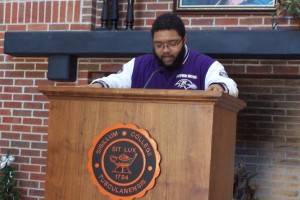
Alexander Spivery, a creative writing major who graduated from Tusculum College in December, was one of 70 participants in the national African-American Read-In held February 15.
As a part of Black History Month, on Friday, Feb. 15, Tusculum College participated in the 24th annual National African-American Read-In. The event was held in the living room of Niswonger Commons of the Greeneville campus with 70 readers and listeners participating in the event. This is the fifth consecutive year Tusculum has participated in the read-in.
Heather Patterson, chair for the Department of English, assistant professor of English and coordinator of the event, said, “We’ve had students read works of more well-known African-Americans (like poems by Langston Hughes and speeches by Malcolm X), but we’ve also been fortunate enough to have students read works by writers and orators that may be unfamiliar to the audience, their own works and works by their friends and relatives.”
The on-campus participation of the Read-In consisted of students, faculty, staff and alumni coming together in a public setting to make literacy a significant part of Black History Month. Readers included students, alumni and Tusculum faculty of varied ethnic backgrounds who read a combination of poetry, essays and fiction written by African-American authors.
“The experience is always rewarding for readers and listeners, and I’m pleased to see so many students—even those terrified by the prospect of speaking in public—participating in this worthwhile event,” said Patterson.
In 1990, the first African-American Read-In was sponsored by the Black Caucus of the National Council of Teachers of English. In 1991, the National Council of Teachers of English joined in the sponsorship. The Read-In has been endorsed by the International Reading Association. More than a million readers of all ethnic groups, from 50 states, the District of Columbia, the West Indies, and African countries have participated. The goal is to make the celebration of African-American literacy a traditional part of Black History Month activities.


